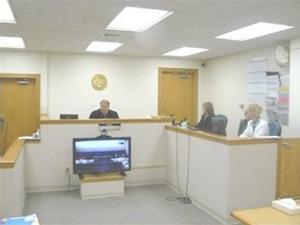Law-enforcement technologySoftware enables swifter justice
A system from the Eagan, Minnesota, company Intertech speeds the process of filing criminal complaints, eliminating steps that used to require paper; this summer, it received approval for its eCharging Web-based system, which cuts down on the time to process the complaints because officials sign off electronically through a password or fingerprint reader

An electronic arraignment in Minnesota // Source: mncourts.gov
It has always been a lot of work to charge someone with a crime in Minnesota. Officials say that perhaps as far back as statehood, charging someone has required signatures of approval from a county attorney, police officer, and a judge before the charges become public. The process of transporting the paper complaint from office to office can take days, wasting time and money in a budget-tight era.
Enter Eagan-based software and consulting firm Intertech. The company won a contract from the Minnesota Bureau of Criminal Apprehension to revamp the system. This summer, it received approval for its eCharging Web-based system, which cuts down on the time to process the complaints because officials sign off electronically through a password or fingerprint reader.
The Minneapolis Star-Tribune reports that in addition, eCharging eliminates the need to re-transcribe complaints because it works with existing software from the county attorney and judicial offices. In the past, the two offices used incompatible software, leading to transcription and spelling errors, officials said. Carver County estimated it will save more than $517,000 in the first five years of using the system.
“It’s an incredible improvement,” said DuWayne Joarnt, eCharging’s project manager. “Not only does it speed up the process, but it frees up law enforcement officers to do value-added police work instead of [transporting] documents around.”
Streamlining difficult processes using technology is one of Intertech’s specialties. The company has worked on a variety of projects, from developing a grant-tracking system for the Minnesota Department of Health to rewriting AgriBank’s internal banking software.
Still, overhauling an antiquated way of approving documents was not easy. In early 2007, Intertech launched brainstorming sessions in four pilot counties: lmsted, Carver, Kandiyohi, and St. Louis. The team observed how complaints were approved and talked with officials about suggestions for how to improve the process.
The Tribune writes that once Intertech understood the structure of how complaints went through the system and the technical requirements it needed to meet, the team came up with a prototype of what eCharging could be, first presenting the Web-based system to a steering committee of about 30 stakeholders.
The proposed system would allow officials to electronically sign off on complaints, set up a profile showing their credentials and track the complaints in the approval process. In November 2008, Intertech received approval from the Minnesota Supreme Court to temporarily accept electronic signatures as a way to approve complaints.
In March 2009, Intertech rolled out eCharging to its first pilot area, St. Louis County. It was optional for agencies to use the software, but the majority said they would give it a try.
After three days of training, the county started using the system. During one demonstration of the process, a criminal complaint was approved by the county attorney, police officer, notary public, court administrator and a judge in a half-hour.
Intertech later expanded its testing phase to six more counties and made small changes to the system. One part of the complaint approval process involves a notary public verifying a police officer’s approval on the complaint. At first, eCharging was designed to perform a computerized check with the National Notary Association to prove the person’s credentials, but the process in some cases took longer than officials wanted, said Dave Schueck, a principal consultant. Now, eCharging just requires notary publics to enter their notary identifier and expiration date into the system.
In July, the Minnesota Supreme Court approved the system for statewide use. Today, eighteen counties use eCharging for criminal complaints, while other counties also use the software for citations, incident referrals and DWI administration forms.
Meanwhile, Intertech is looking into using its experience and knowledge to help other states with similar services.
“The stuff that we’re doing here is pretty applicable and transferable from state to state,” said Ryan McCabe, a partner at Intertech. “We have the experience of successfully solving this problem.”
